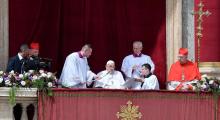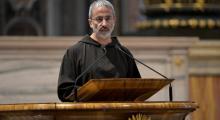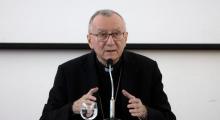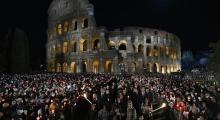Issued by the Catholic Center for Studies and Media - Jordan. Editor-in-chief Fr. Rif'at Bader - موقع أبونا abouna.org
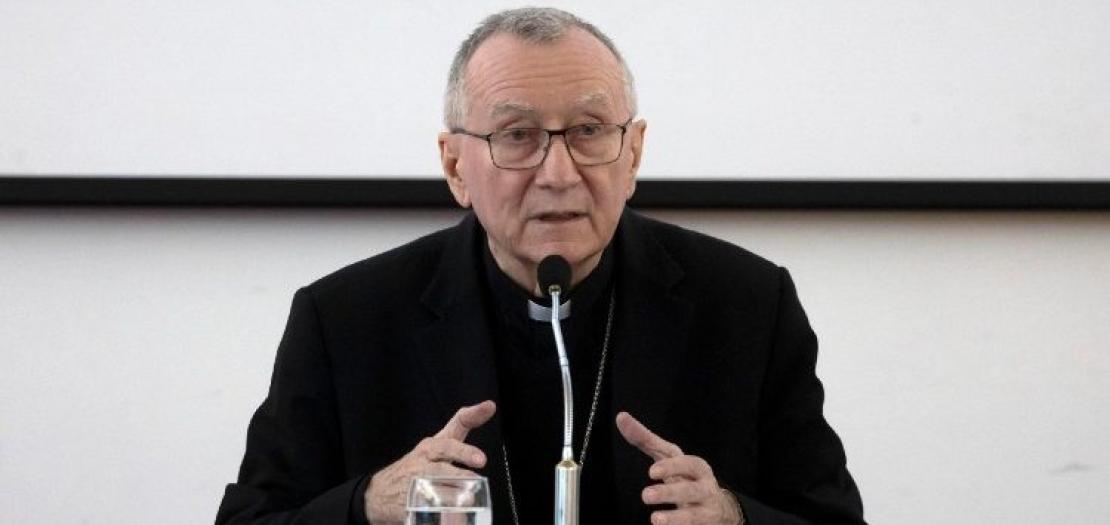
The Holy See is very concerned "about the risk of an escalation of the conflict" in Ukraine, which would cause "further suffering and new victims," while it recognizes that "it would be inhumane to deny Ukrainians the right to defend themselves." Cardinal Secretary of State Pietro Parolin stated this point on Friday, April 18, in an interview with Italian newspaper La Repubblica on some key international issues.
"As Pope Francis has repeatedly reminded us, peace cannot be imposed; it is built patiently, day by day, through dialogue and mutual respect," Cardinal Parolin remarked in the interview published on Friday, 18 April, expressing appreciation for any initiative that could lead to peace, as "this war cannot go on."
Breaking the spiral of permanent conflict
According to the Vatican Secretary of State, the underlying problem "is an increasingly individualistic view of man and a growing mutual distrust among members of the international community."
"No one trusts anyone anymore, and this climate generates fear, rearmament, preemptive aggression, and a spiral of permanent conflict, “ he said. “It is precisely in this context that the Holy See's mission is to bring a small light and to amplify the words of the Successors of Peter, who for over a century have been saying no to war and the arms race, as Pope Francis continues to do."
Stressing the "starting point," namely that the Holy See "clearly supports the sovereignty and territorial integrity of Ukraine," Cardinal Parolin notes that "it is up to the Ukrainians themselves to decide what they are willing to negotiate or potentially concede from their perspective." A just and lasting peace, according to the Vatican diplomat, will only be possible if founded "on respect for justice and international law."
President Trump and multilateralism
The Secretary of State, who will receive U.S. Vice President J.D. Vance tomorrow, April 19, during his visit to Rome, was also asked about President Trump’s policies and multilateralism.
"It is clear that the current U.S. Administration's approach is very different from what we are used to," Cardinal Parolin acknowledged, adding: "The Holy See always strives to place the human person at the centre, and many vulnerable people are suffering enormously, for example, due to cuts in humanitarian aid."
"The Holy See," he further clarified, "consistently supports a multilateral approach and believes that international law and the consensus of States must always be encouraged."
This role in defending multilateralism should first and foremost belong to Europe. "In light of this," he stated, "the term 'rearmament' is unfortunate, as it always signals closures and new conflicts, even if used to justify Europe’s need to invest in its defence, particularly in light of a U.S. disengagement on the matter."
The Secretary of State ruled out that, due to the many ongoing wars, we are facing a "year zero in interfaith dialogue": one must not fall into the "trap of seeing these as religious conflicts," he warned, because "these are manipulations of religion and spiritual values for much more worldly purposes."
The importance of dialogue
Regarding the ongoing devastation in Gaza, Cardinal Parolin said that data and images from there are "humanly horrific and morally unacceptable." "Self-defence is legitimate," he stated, "but it can never involve the total or partial annihilation of another people or the denial of their right to live in their own land."
Asked about relations with China, the Secretary of State confirmed that "the Holy See certainly maintains the desire to have its own liaison office in Beijing," a step that remains "in the realm of the desirable" for now.
Finally, Cardinal Parolin strongly reaffirmed the critical importance of dialogue: "I believe that the greatest contribution the Holy See can make in the current international landscape is precisely that of dialogue: bearing witness to its importance and practicing it personally, even when it is difficult, even if it becomes an unpopular choice, even if it seems useless or unproductive."


